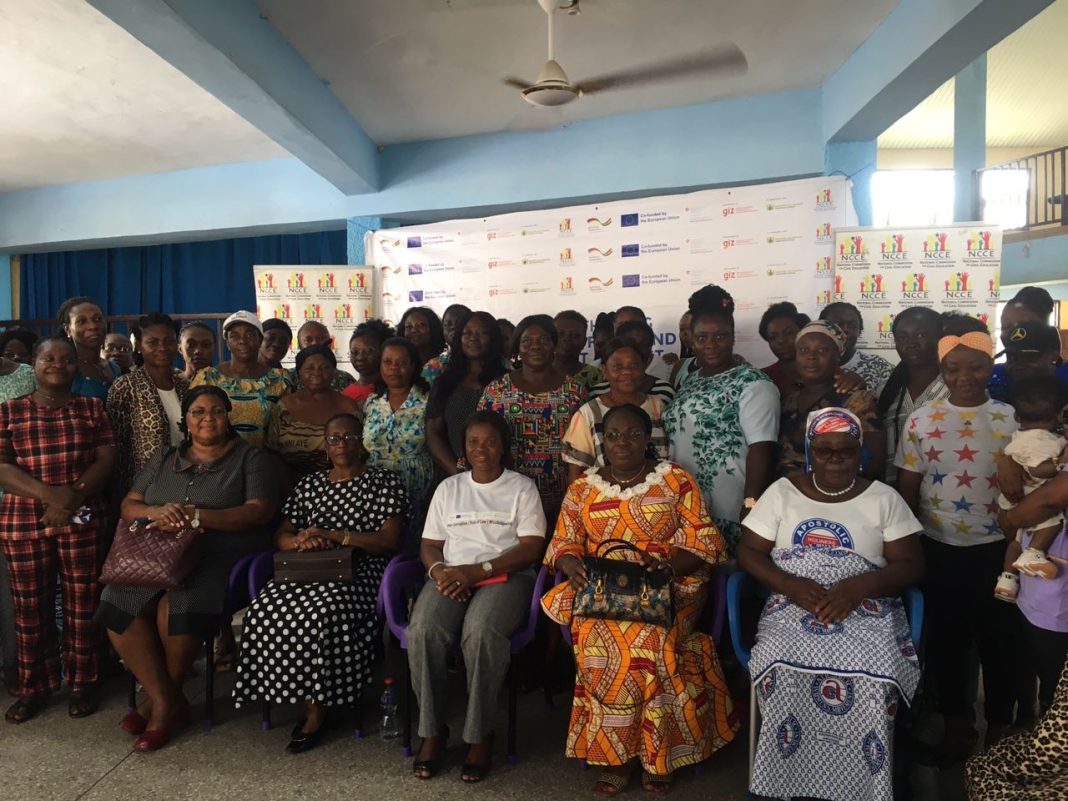By Mavis Quansah
Tema, Nov. 1, GNA -The Tema Metropolitan office of the National Commission for Civic Education (NCCE) has organised a sensitisation programme for selected women in the metropolis on the Rule of Law and the fight against corruption
The engagement was powered by the Gesellschaft für Internationale Zusammenarbeit (GIZ) and sponsored by the European Union.
Madam Gifty Agyeiwaa Badu, the NCCE Tema Metropolitan Director, welcoming participants, said women played vital roles in the socioeconomic development of the country but despite this, they continued to face systemic barriers such as limited access to education, economic inequality, and under-representation in governance and decision-making spaces.


Madam Badu noted that these challenges made women vulnerable to corruption and abuse of power, especially in public service delivery such as healthcare, education, and market regulation.
She said it was therefore important to educate and empower them to join the fight against corruption.
She defined corruption as the abuse of entrusted power for private gain and outlined bribery, extortion, nepotism, and fraud, among others, as some forms of corruption.
“For example, market women may face extortion through illegal levies, young women may encounter sexual harassment in exchange for services, and mothers may be compelled to pay bribes to secure basic health and education services for their families. Such experiences not only undermine women’s dignity but also perpetuate poverty and inequality,” she said.


According to her, the Rule of Law demanded that all persons and institutions should be accountable to just laws, fairly enforced, and independently adjudicated, adding that strengthening women’s understanding of this principle as well as their rights and available legal protections, were critical to building resilient communities where women were empowered to stand against corruption and injustice.
Madam Fati Mahami, the Tema Sub-Regional Director for the Commission of Human Rights and Administrative Justice (CHRAJ), educated the participant on the commission’s mandate to protect the fundamental human rights of citizens.
She added that the Commission was mandated by the 1992 constitution to protect and promote human rights and freedoms enshrined in the constitution.
For one to fight corruption, she explained that it was important for them to know their rights to be able to tell if their rights were being infringed upon either by public officers or individuals.
Madam Mahami said CHRAJ investigated injustice, corruption, or misappropriation of public funds, and she entreated the public to report any form of corruption or injustice, either by a public officer or individuals, for her outfit to investigate and bring justice to the affected people.


She said the Commission through the whistleblowing Act was mandated to protect individuals from harm after reporting crime and encouraged participants to be bold in reporting corruption and injustice activities.
Chief Superintendent of Police Christine Yevunoo, the Tema Metro Regional Coordinator for the Domestic Violence and Victim Support Unit (DOVVSU), mentioned that the unit protected individuals against violence and other crimes that affected their emotional, physical, and cognitive wellbeing.
She added that they also protected reporters who came in with complaints through the Whistle Blowing Act.
Madam Yevunoo noted that one of the main issues they faced was informants telling people that they have reported an issue at DOVVSU, putting themselves at risk of being harmed, and encouraged individuals to remain quiet and allow the Police to investigate their issues whenever they made a complaint.
She also warned them against providing false information that could hinder investigations initiated by the relevant institutions.
She mentioned that it was only when individuals had the courage to report cases that the institutions responsible for fighting corruption and injustice could act, stressing that the public must be bold to step forward and speak against corruption.
GNA
Edited by Laudia Sawer/Linda Asante Agyei
